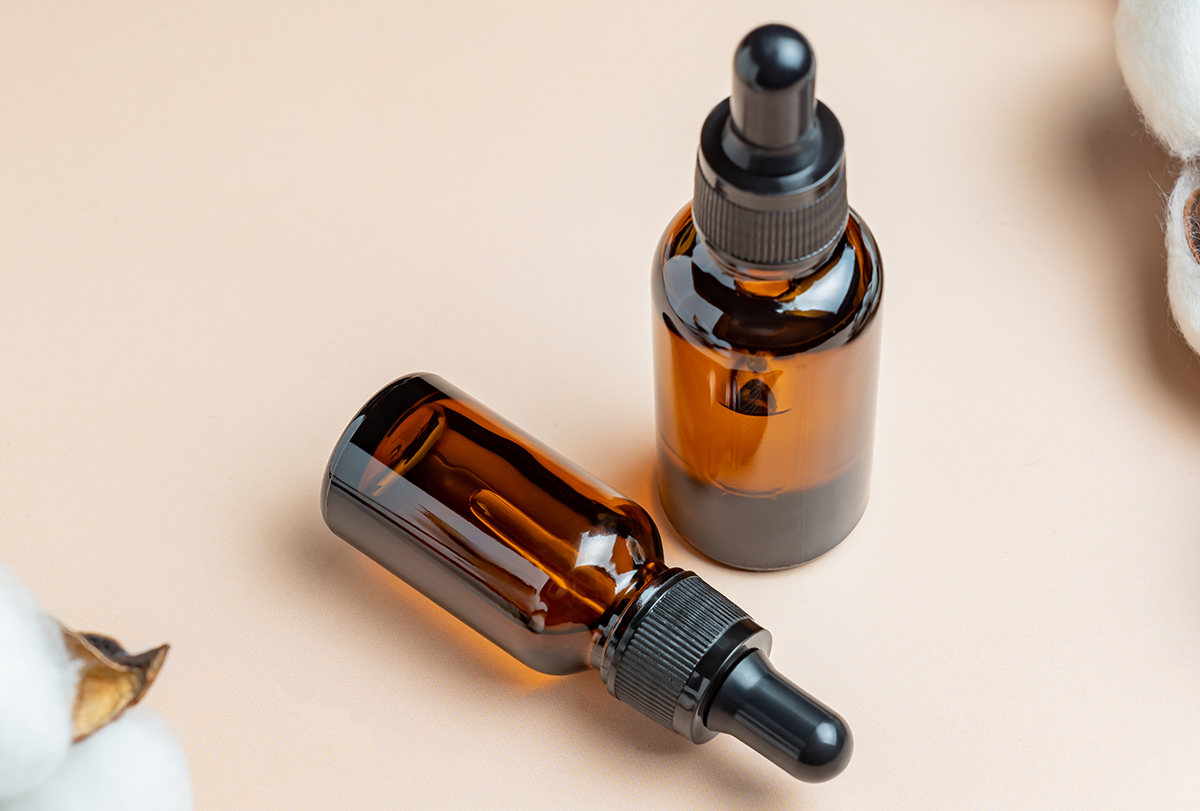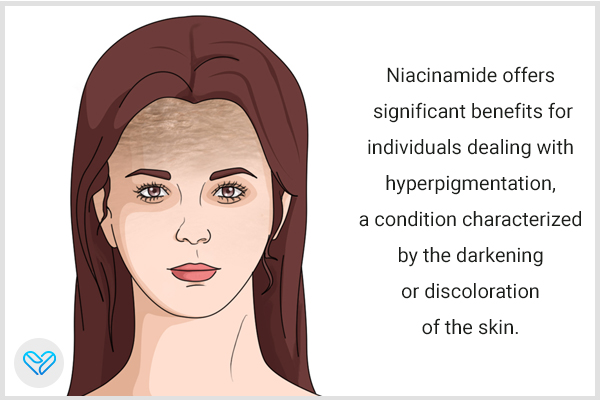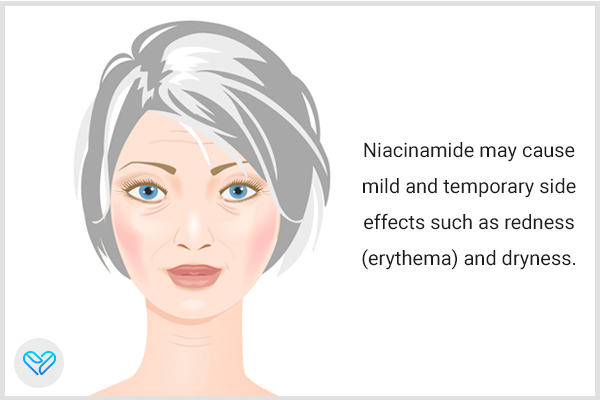In this article:
Mandelic acid and niacinamide are two highly sought-after ingredients in the realm of skin care. While each ingredient possesses distinct properties, they both offer remarkable benefits for improving skin health and addressing common concerns.

Mandelic acid, a popular skin care ingredient classified as alpha-hydroxy acid, has garnered attention for its potential to enhance skin health and address common concerns such as acne, hyperpigmentation, and signs of aging. (1)
While niacinamide, also known as vitamin B3, has long been recognized for its nutritional value, its skin care benefits have only recently gained widespread attention. The use of niacinamide in topical applications has become increasingly popular due to its potential to enhance skin health and address various skin concerns. (2)
Understanding the unique properties of mandelic acid and niacinamide enables you to make informed decisions about incorporating them into your skin care regimen for optimal results.
Read on to find out which might be the best for you.
Mandelic Acid Versus Niacinamide
| Mandelic acid | Niacinamide |
|---|---|
| Works for sensitive skin or readily irritated skin | Good for oily and acne-prone skin |
| Manages the symptoms of rosacea | Deals with hyperpigmentation |
| Treats acne | Improves the appearance of aging facial skin |
| Reduces hyperpigmentation | Helps brighten skin |
| Addresses signs of aging |
Who Should Use Mandelic Acid?
Mandelic acid, a type of fruit acid known as alpha-hydroxy acid (AHA), (3) offers various benefits for people with various skin conditions.
1. People with sensitive or easily irritated skin
A mandelic acid is an excellent option for individuals with sensitive or easily irritated skin. Its large molecular size allows for a slow and gentle absorption into the skin, reducing the likelihood of irritation or adverse reactions. (4)(5)
2. Individuals struggling with conditions such as rosacea
Mandelic acid’s gentle exfoliating properties (5) make it well suited for individuals with rosacea or other similar skin conditions. It helps to remove dead skin cells and reduce pores without aggravating the sensitivity associated with these conditions.
By promoting a smooth and clear complexion, mandelic acid can contribute to managing the symptoms of rosacea.
3. People with sensitive skin aiming to alleviate acne, pigmentation, or indications of aging
Mandelic acid is known for its usefulness in controlling acne and lessening hyperpigmentation. It helps to exfoliate the skin, unclog pores, and reduce the impression of imperfections.
Mandelic acid also aids in reducing the presentation of melanin, resulting in a more even skin tone and lightening of dark spots.
Moreover, its exfoliating action can discourage the impression of fine lines and wrinkles, deeming it to be a valuable ingredient for those working to address signs of aging. (3)(1)
Who Should Use Niacinamide?

The following people may prefer niacinamide:
1. Individuals with oily or acne-prone skin
Niacinamide is an excellent option for people with oily skin or who are prone to breakouts. It helps regulate sebum production, reducing excess oiliness and preventing clogged pores.
By regulating sebum levels, niacinamide can help decrease acne breakouts and facilitate a more balanced complexion. (6)(7)
2. People experiencing hyperpigmentation
Niacinamide offers significant benefits for individuals dealing with hyperpigmentation, a condition characterized by the darkening or discoloration of the skin.
When used topically, niacinamide has been indicated to effectively lessen epidermal hyperpigmentation and diminish the appearance of pigmented spots.
Studies have demonstrated that niacinamide is particularly effective in reducing hyperpigmentation and improving skin lightness within 4 weeks of consistent use. (2)(8)
3. Those seeking antiaging effects
Niacinamide is highly beneficial for individuals experiencing skin aging.
When applied topically, it can reduce fine lines and wrinkles, lighten hyperpigmented spots, resolve red blotches, address skin yellowing, and improve skin elasticity.
These effects make niacinamide a valuable ingredient for those seeking to improve the appearance of aging facial skin. (9)
Note: Niacinamide and mandelic acid offer overlapping benefits, and considering these factors can help you determine which ingredient may be more suitable for your specific skin concerns and sensitivities.
Possible Side Effects of Mandelic Acid and Niacinamide

Side effects of mandelic acid are generally minimal and rare, but some individuals may experience mild itching or redness. These side effects are uncommon and usually temporary.
Similarly, niacinamide may cause mild and temporary side effects such as redness (erythema) and dryness. However, these effects can be easily managed by regularly applying moisturizers to the skin. (10)
Can You Use Mandelic Acid and Niacinamide Together?
Yes, according to experts, mandelic acid and niacinamide can be used together in a skin care regimen. These two ingredients are commonly well tolerated and can complement each other’s functions.
However, it’s always a good idea to patch-test new products and add them slowly into your routine to ensure compatibility and minimize the risk of irritation.
Most-Asked Questions
Which one is better for acne-prone skin?
Both niacinamide and mandelic acid can be beneficial for acne-prone skin, but mandelic acid may be gentler for sensitive skin types.
Does niacinamide work for hyperpigmentation?
Yes, niacinamide can help lighten hyperpigmented spots and even out skin tone.
Can mandelic acid lessen wrinkles?
Yes, mandelic acid’s exfoliating properties can enhance skin texture and reduce the impression of wrinkles.
Which one is more appropriate for sensitive skin?
Mandelic acid is often recommended for individuals with sensitive skin because of its mild exfoliating action.
Final Word
Both mandelic acid and niacinamide offer extraordinary advantages for the skin. Mandelic acid provides gentle exfoliation and is suitable for sensitive skin, while niacinamide offers multiple skin care benefits and is well tolerated by various skin types.
Incorporating these ingredients into your skin care routine, either individually or together, can help address specific skin problems and enhance overall skin health.
- Was this article helpful?
- YES, THANKS!NOT REALLY


